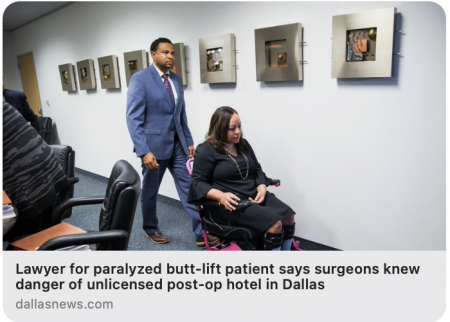The Hidden Dangers of Unlicensed Recovery Houses for Plastic Surgery Aftercare
Undergoing plastic surgery is a significant decision that requires thorough research and careful consideration. After the procedure, patients need proper care and support during the recovery process to ensure optimal results. Recovery houses have become increasingly popular for this purpose, but the ubiquity of unlicensed recovery houses poses a significant danger to patients’ well-being, both in the United States and abroad.
Recently, the American Society of Plastic Surgeons wrote an article describing the problem:
“When you go to these recovery centers, you want to actually make sure they are run by licensed physicians, providers, nurses, and that they’re clean,” said Smita Ramanadham, MD. “A lot of times, unfortunately, that’s not the case, and you’re sort of left in this room with lots of other patients and people that are taking care of you who don’t have the right degrees or licenses to do so.”
The Paralyzed Butt Lift Patient: A Harrowing Tale
The dangers of unlicensed recovery houses are well illustrated by the story of a paralyzed butt lift patient in Dallas, Texas, as reported by The Dallas Morning News in their article from January 31, 2019. The patient had undergone a buttock augmentation procedure and stayed at an unlicensed post-op hotel. According to the patient’s lawyer, surgeons were aware of the risks associated with this facility. Unfortunately, the patient was left paralyzed due to complications arising from her stay at the unlicensed recovery house. This case serves as a stark reminder of the potential hazards awaiting patients who trust their post-operative care to unlicensed establishments.
Inadequate Care and Health Risks
Unlicensed recovery houses often lack the necessary medical oversight and trained staff to provide proper care to patients. These facilities may not adhere to the strict regulations and standards that licensed recovery houses follow, putting patients at risk. Patients have reported being left in their own waste, not receiving prescribed medications, remaining unbathed, and enduring unchanged clothing for extended periods of time. Such conditions not only lead to discomfort but also raise serious health concerns.
Improper Disposal of Biohazardous Waste
One of the most alarming aspects of unlicensed recovery houses is the improper disposal of biohazardous waste. Proper disposal of biohazard waste is crucial to prevent infections and disease transmission. Unlicensed recovery houses often lack the expertise and resources to handle this aspect of patient care, which can have severe consequences.
In an article by CBS News Miami, a woman operated an unlicensed post-cosmetic surgery recovery home, which posed a grave risk to the health and safety of the patients. Additionally, the owner was accused of possibly holding a woman against her will.
Hiring Unlicensed Caretakers and Massage Therapists
These unlicensed facilities often (if not usually) hire unlicensed caretakers and massage therapists who engage in a dangerous and illegal procedure known as “incisional drainage,” masquerading it as “lymphatic massage,” a legitimate and helpful post op therapy when performed by a licensed therapist. This deceptive practice of incisional drainage not only jeopardizes patient safety but also violates the law.
Incisional drainage involves reopening a patient’s surgical incisions and applying pressure to force out bodily fluids such as blood and lymphatic fluids. The procedure is often touted as a method to reduce post-operative swelling and accelerate healing, but it is far from safe. This practice can disrupt the healing process, increase the risk of infection, and cause severe complications, including wound dehiscence and potential long-term damage.
In an effort to legitimize their actions, unlicensed individuals working in recovery houses may refer to incisional drainage as “lymphatic massage.” Lymphatic massage, when performed by licensed and trained professionals, is a legitimate therapy designed to enhance lymphatic system function, reducing swelling and inflammation post-surgery. However, when unlicensed practitioners claim to be performing lymphatic massages and are, in reality, conducting incisional drainage, they are not only deceiving patients but putting their health at risk.
Caretakers and massage therapists (or people posing as licensed therapists) who perform this procedure may face criminal charges and legal consequences, including lawsuits from injured patients. Furthermore, patients undergoing these procedures are at risk of severe complications, such as infection, delayed healing, the need for additional surgeries to address problems caused by improper care, or even death.
Changing Names to Evade Scrutiny
Unscrupulous operators of unlicensed recovery houses often change the names of their businesses when negative reviews or complaints surface on social media. This practice makes it difficult for prospective patients to assess the history of a particular facility.
According to reports from Local 10 News, two separate and unrelated incidents in both June and July of 2023, unlicensed post-op recovery houses in Miami-Dade County were accused of operating without the necessary licenses. In one case, the owners were charged with 13 felony counts including charges for fraud. In the other case, the owner was charged with two felony charges of operating an assisted living facility without a license (she owned two), plus felony littering and hazardous waste violations for placing into regular trash materials that were “saturated with human fecal matter, blood and urine, thereby creating a credible and actual biological hazard to the well-being and health of the public.”
These cases highlight the importance of digging deeper and checking with the state’s regulatory agency to verify the legitimacy of these establishments.
State Licensing and Complaints
In the United States, some states require recovery houses to be licensed (often as assisted living facilities), but this requirement varies from state to state. Patients must take the initiative to research their state’s specific regulations and verify whether a recovery house holds the necessary licenses. Relying on social media profiles is insufficient, as unscrupulous operators can easily manipulate their online presence.
Furthermore, patients should also check for any complaints filed against the owners or operators of recovery houses. Complaints may provide insight into past issues and red flags regarding a facility’s safety and quality of care.
Online Scams
Another thing to be wary of is the prevalence of online scams. People make Instagram or TikTok pages that advertise recovery services, get paid, and then never show up to pick up clients at the airport or after surgery. This phenomenon is extremely common and one sees posts in various Facebook groups about dolls being stranded who need help.
If you are planning on getting plastic surgery out-of-state or out-of-country, be sure to take the time to investigate where you will be staying to recover well ahead of time and before you send money.




